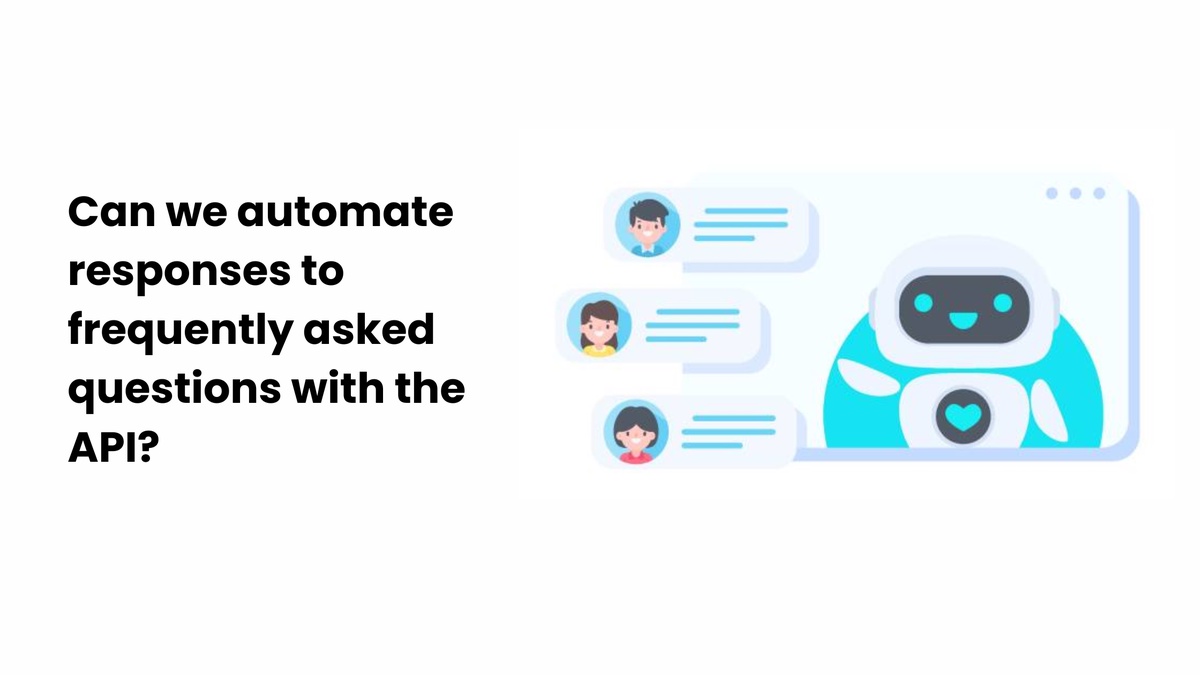Customer service is a battlefield in today's hectic digital environment. Businesses are inundated with questions all the time, and the ubiquitous FAQ section is frequently the first line of defence. However, answering a barrage of repeating questions by hand can be a laborious and resource-intensive operation.
This is where Application Programming Interfaces, or APIs, become magical. Businesses may automate FAQ responses with APIs, freeing up important human resources and guaranteeing constant, round-the-clock customer service.
But how precisely does this function? Hold on tight, as we delve further into the realm of API-driven FAQ automation, examining its advantages, difficulties, and practical uses.
Understanding the Power of APIs:
Let's first review APIs in order to set the stage for automating responses. Picture yourself in an upscale eatery. The interface acts like a waiter, and you, the user, tell it what you want to order (your query). The kitchen (the API), which gets your meal (the response) from the pantry (the knowledge base), receives your request from the waiter. At last, the server returns the dish to you. These middlemen are APIs, who make it easier for various apps to communicate and share data.
The API is the primary component of the FAQ automation system. The API kicks in when a user makes a query via a designated interface (website, app, etc.). It makes use of Natural Language Processing (NLP) to decipher the question's meaning. NLP analyses the user's query and determines its essential meaning, acting as a smart translator.
After the query has been understood, the API searches a sizable knowledge base, which is a digital library of previously authored FAQs and the responses that go with them. In the event that a perfect match is discovered, the API obtains the response and easily provides it to the user via the interface. Users are able to experience quick pleasure since the entire process takes place in milliseconds.
Benefits of Automating FAQ Responses:
There are a lot of benefits to automating FAQs with APIs. Here are a few of the main advantages:
- Boosted Efficiency: When your customer service team isn't spending time answering the same queries over and over, just think of the time that will be saved. This gives them more time to handle more complicated problems and offer individualised assistance.
- 24/7 Availability: Consumers don't follow a 9–5 timetable. Using automated responses, users can get answers to their inquiries anywhere, at any time. Improved client satisfaction results from this 24/7 access.
- Consistent Accuracy: Human error is inevitable. But with an automated system, responses are pulled directly from a pre-populated knowledge base, ensuring consistent and accurate information delivery.
- Increased Customer Satisfaction: Faster resolution of inquiries leads to happier customers. By providing immediate answers, API-driven automation reduces frustration and improves the overall customer experience.
- Enhanced Scalability: As your business grows, so too will the volume of inquiries. Unlike human teams, automated systems can effortlessly handle a surge in questions without compromising on quality or speed.
- Potential for Personalization: While some questions might have one-size-fits-all answers, others require a more tailored approach. Advanced systems can leverage user data (purchase history, location) to personalise responses and offer a more contextual experience.
Challenges and Considerations:
While API-driven FAQ automation offers a plethora of benefits, it's not without its challenges. Here are some key considerations:
- NLP Limitations: NLP technology, though impressive, is still under development. Complex or nuanced questions can sometimes be misinterpreted by the system.
- Knowledge Base Maintenance: The accuracy of automated responses hinges on a well-maintained knowledge base. It's crucial to regularly update FAQs with the latest information to avoid providing outdated or irrelevant answers.
- Handling Unforeseen Queries: What happens when a user's question doesn't match any existing FAQs? The system needs to be equipped to handle these situations gracefully, by either offering alternative solutions, directing users to human support channels, or prompting them to rephrase their question.
- Quality Control: Automated responses should be clear, concise, and easy to understand. Regularly reviewing and revising responses ensures they maintain a human-like quality.
- Security Concerns: Protecting user data is paramount. Secure APIs and robust data storage practices are essential when implementing this technology.
The Future of API-Driven FAQ Automation:
The capabilities of API-driven FAQ automation will advance along with technology. Here's a look at potential future developments:
- Advanced AI and Machine Learning: Enhanced AI and machine learning algorithms will enable systems to understand even the most complex and convoluted user queries, providing more nuanced and accurate responses.
- Context-Aware Automation: Systems will become adept at understanding the context of a user's question, taking into account factors like purchase history, past interactions, and location to deliver highly personalised responses.
- Multilingual Support: Breaking down language barriers, APIs will facilitate automated FAQ responses in a multitude of languages, catering to a global audience.
- Integration with Chatbots: The marriage of API-driven automation with chatbots will create a seamless conversational experience for users, allowing them to interact with a virtual assistant 24/7 for all their queries.
Conclusion:
Exceptional customer service is now a need in today's consumer-focused environment, not an extravagance. An effective way to streamline customer assistance, increase productivity, and guarantee accurate and consistent information delivery is through API-driven FAQ automation.
This automation will become increasingly more advanced as technology develops, erasing the distinction between human and machine contact and opening the door to a future of seamless and customised client support.
Author Bio:
Anuj Singh, CEO | Founder of Go4whatsup, best WhatsApp Business API Solution Provider offering advance features like WhatsApp CRM, WhatsApp Chatbots, WhatsApp Bulk Messaging. It enables companies to reach their clients where they are—on WhatsApp, the messaging app with the highest market penetration. Due to its widespread presence, many clients and prospects are reachable and prepared for immediate interaction.


No comments yet